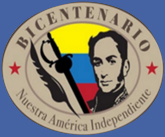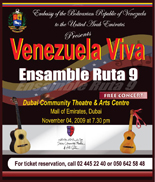
Bolivarian Republic of Venezuela
Embassy in the UAE
Social ProgrammesIlliteracy & Educational Discrimination Imagine growing up in one of the richest oil countries in the world. A country of immense natural resources that could be used to ensure that all citizens had access to equal opportunities in education, so that citizens could develop themselves and make a contribution to society. Imagine, however, that your government failed to share the nation's resources fairly, and justify millions literally in the dark. Without the basic tools of reading and writing, the foundations of democracy are inaccessible to you. Last summer, the Venezuelan government launched a series of sweeping educational initiatives to combat the learning gap that had historically plagued the nation's poor. Establishing thousands of local, volunteer-based schools in rural communities and urban slums across the Caribbean nation, the initiatives have made remarkable progress. This July, Venezuela and educators from around the world will celebrate the 1.2 million adults who have been taught to read in the first year of these programs. The country is now on track to achieve a near-complete elimination of illiteracy. The Education Gap Just ten years ago, Venezuela's illiteracy rate was nearly 9%, or about 2 million people, primarily in rural Indigenous communities and poor inner-city families. Under previous governments, students had been required to pay fees to attend public schools, which in practice excluded the most needy from receiving basic education. The most remote parts of the country had no schools at all, and government spending on public schools declined steadily throughout the 1990s. Although the country enjoyed immense oil wealth, previous government made little effort to eradicate this plague of illiteracy and educational discrimination. Venezuelans Vote for Change By 1998, Venezuelans had grown tired of their governments' ignoring of their basic needs. They turned to the ballot box and elected Hugo Chávez Frías, a leader with a mandate to increase opportunities for the country's poor, focusing on education, health care and land reform. The government quickly eliminated fees for public schools. They codified the right to education into a brand new Constitution, which was approved in by over 87% of the electorate. Under the new Constitution, Hugo Chávez was again elected to the Presidency with almost 60% of the popular vote - a huge vote of confidence for the new Constitution and the social programs addressing the needs of the country's majority poor population. School Boom under the Chávez Administration To meet the demand for primary education, Venezuelan leaders deployed the military to an ambitious school construction project in 2000. Within four years, more than 3000 new schools had been built. School attendance at all levels had jumped 25% by 2002, representing approximately 1.3 million students who had previously been justified out of the system. During a 2001 visit to Venezuela, The Director General of the United Nations Education Scientific and Cultural Organization (UNESCO), Koichiro Matsuura, lauded Venezuela's education initiatives as well as its increase in education spending to 6 percent of GDP-far above the 3.9 percent average in developing countries. The Missions Mission Ribas: Back to High School Mission Sucre: Access to Higher Education |








